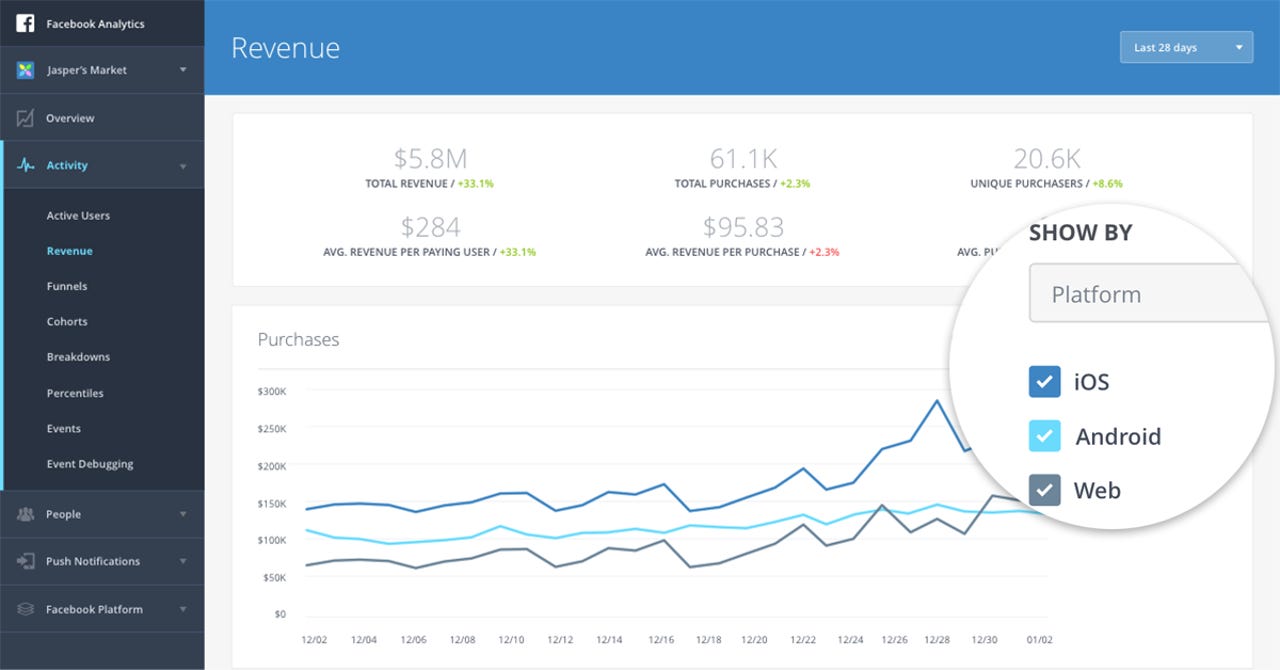Facebook adds cross-platform metrics to its analytics tool


Facebook is adding cross-platform metrics to Analytics for Apps.
Facebook on Wednesday announced a series of new features to Analytics for Apps, the free tool it launched in 2015 to advance its mission of global connectivity and to build up advertiser relationships.
The product launched last year with a focus on mobile apps, but Facebook is introducing it in beta support for web measurement and cross-platform metrics. The new metrics should help businesses get a more holistic view of their customers. According to a study Facebook commissioned in 2014, 53 percent of people who own two devices switch between them to complete tasks or activities. For people with three or more devices, that figure rises to 77 percent.
"If a user uses one device but then switches to another, we often know who that person is," Facebook Product Manager Josh Twist said to ZDNet. "Not looking at that cross-device picture is to ignore a huge part of your users' behavior."
Facebook is also integrating Analytics for Apps directly into Facebook pixel, a tool that helps advertisers target certain audiences for ad campaigns and track the campaign's performance.
Since Analytics for Apps was launched in April 2015, more than 800,000 unique apps have used it, Facebook says. Businesses don't have to use Facebook Login, have an advertising account, or have any other connection to Facebook to use it.
Facebook offers the product to advance its mission "to connect the world," Twist said. "We know we can't do that alone, so that's why we created this developer platform."
The company's efforts at helping businesses are built on three pillars: enabling them to build experiences, to grow them, and then to monetize them. "Analytics fits squarely into growth," Twist explained.
Aside from advancing Facebook's broader mission of achieving global connectivity, the free tool obviously helps enhance advertising products.
"As an analytics user, we make it very easy for you to do user targeting," Twist explained. After an advertiser uses analytics to identify the sort of customer they want to profile, Facebook can use advanced machine learning, Twist said, to identify a larger pool of people who should look and behave like that target group.
Facebook also recently added push notifications to Analytics for Apps, allowing a business to send notifications to anyone once they meet certain criteria. For instance, an ecommerce business might send a notification to someone once they've left an item in their cart for longer than four hours.
In addition to introducing cross-platform metrics, Facebook on Wednesday also announced a new feature called user properties, which gives businesses insights into the characteristics of their customers -- in an anonymous and aggregated way.
It offers "some Facebook magic only we can bring," Twist said. In other words, advertisers can track characteristics like age and gender but also things like relationship status. Businesses can integrate their own data, such as CRM data, and filter customer activity based on certain characteristics. For instance, an airline could filter for customers in their rewards program.
To keep it anonymized, Facebook redacts demographic information from any report looking at less than 100 users, Twist said.
Facebook is also adding a feature called "sharing insights", making it easier for publishers to learn more about when their content is going viral. It shows which content is becoming popular on Facebook, based on articles published in the last 10 hours, and which URLs have been shared the most within five hours.